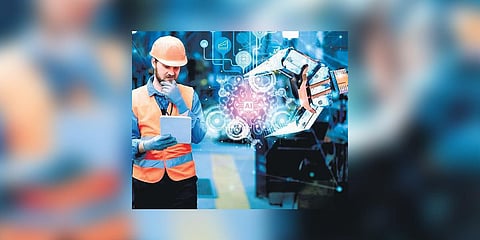

BENGALURU: Generative AI has the potential to impact much more than just the task at hand. It’s also starting to profoundly reshape organisations and markets. The latest report by Accenture titled 'Human by Design: How AI Unleashes the Next Level of Human Potential' explores how after years of exponential innovation, technology — especially generative AI — is becoming more human.
The research finds that gen AI has the potential to impact 44% of all working hours across industries, enable productivity enhancements across 900 different types of jobs, and create $6-8 trillion in global economic value. According to business leaders it surveyed globally, 95% believe that making technology more human will massively expand the opportunities of every industry. About 95% also believe that how we interact with data is changing with AI.
Also, 93% think it is more important than ever to innovate with purpose considering the rapid pace of technology advancements. The study identifies four key trends in the move to make design tech more human:
1) A match made in AI: Ushering in a world where data is reorganised in ways that facilitate human-like reasoning and even mimic creativity. Instead of combing through mountains of search engine results, people will receive curated, personalised responses in the form of advice, a summation of a vast set of results, an essay, an image or even a piece of art.
2) Meet my agent: AI is taking action, and soon whole ecosystems of AI agents could command major aspects of business. Appropriate human guidance and oversight is critical, the research says.
3) The space we need: Creating rich, new immersive worlds of personal interaction by extending our physical, 2D worlds into new 3D environments created using spatial computing, metaverse, digital twins and AR/VR technologies. These new places and experiences will fuse our digital and physical worlds, bringing us together in new ways, fueling innovation and improving the way we work, live and learn. In the retail space, a third (33%) of consumers indicated they are, or would be interested in, using spatial computing technologies or devices for shopping today.
4) Our bodies are electronic: A suite of technologies from eye-tracking to machine learning to BCI (brain-computer interface) are starting to understand people more deeply and in more human-centric ways.
“As AI, spatial computing and body-sensing technologies evolve to a point where tech appears to imitate human capabilities and seem invisible, what you’ll see left are the people—empowered with new capabilities to accomplish things they once considered impossible,” said Paul Daugherty, chief technology and innovation officer at Accenture.
“Human-centered technologies like generative AI are poised to unleash human potential and deliver a staggering array of business and societal benefits, but only if we take a balanced, ‘human by design’ approach that ensures these technologies are used fairly and responsibly,” added Daugherty.